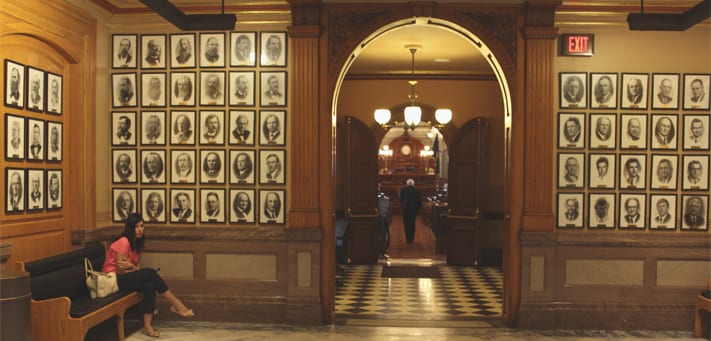An alternative plan, for Kansas Medicaid Expansion
 Photo: Mike Shields/KHI News Service
Photo: Mike Shields/KHI News Service
Published February 9th, 2015 at 4:51 PM
An alternative plan to expand Medicaid loaded with clauses meant to woo Republicans has been introduced in Kansas. But it could face the same difficult political climate that killed similar bills in other states last week.
Rep. Tom Sloan said Monday that the proposal introduced by the Vision 2020 Committee he chairs represents a Kansas solution that can appeal even to those who campaigned on unwavering opposition to the federal health care reforms spearheaded by President Obama.
“The governor and other legislative leaders have said they rejected the federal program, the Affordable Care Act, but would look at a Kansas plan,” Sloan said. “This is as Kansas as the committee can make it.”
Legislators in Wyoming and Tennessee who tried a similar strategy to expand Medicaid in their states saw their proposals die last week amid opposition from limited-government advocacy groups.
The bill that Sloan’s committee created comes after weeks of testimony from stakeholders.
The proposal, House Bill 2270, gives the secretary of the Kansas Department of Health and Environment the authority to levy fees on hospitals and other providers to offset the state’s portion of the expansion cost.
It also allows the KDHE secretary to institute work requirements for the estimated 140,000 to 170,000 Kansans who would become eligible for Medicaid if expansion is approved. Volunteer work could qualify if the secretary deems it acceptable.
The bill also calls for data analysis of how Medicaid expansion affects the Kansas economy and the health outcomes of Kansans.
Sloan said the Kansas Hospital Association is on board with the plan because the additional Medicaid dollars would help defray the cost of providing care for Kansans who currently are uninsured.
Without those dollars, medical facilities are in trouble, he said, especially those in rural areas. The state’s budget crunch following income tax cuts makes it clear that using any state funds for Medicaid expansion would be a tough sell.
“The hospital association came in and testified about the need, that the critical access hospitals really are at the risk of closing their doors in a lot of cases,” Sloan said. “The hospitals recognize that they have to participate (in paying for it). That the state general fund is not there.”
Chad Austin, the Kansas Hospital Association’s vice president for governmental affairs, said the organization is reviewing HB 2270.
“With that said, we are encouraged with the continued legislative dialogue on this important topic,” Austin said.
Under the Affordable Care Act, Medicaid eligibility is extended to Americans who earn up to 138 percent of the federal poverty level —$16,105 annually for an individual and $32,913 for a family of four. The federal government would pay 100 percent of Medicaid expansion costs through 2016, at which point the cost sharing will begin phasing down to what ultimately will become a 90-10 federal-state split.
The U.S. Supreme Court ruled in June 2012 that states cannot be required to participate in the expansion, and about half the states have opted not to do so.
House Bill 2045, introduced by Rep. Jim Ward, a Wichita Democrat, would have Kansas join the expansion states. But the bill is going nowhere in the Republican-controlled Legislature.
Sloan said he has asked House Speaker Ray Merrick to send the alternative expansion bill to a House Appropriations subcommittee that is not bound by the same session deadlines as other committees to keep it alive for discussion.
The Vision 2020 plan would have to clear several hurdles — procedural as well as political.
Kansas would have to get federal approval for elements of the plan, including the work requirement and the provider fee, and that process could take up to a year.
Medicaid in Kansas is administered by three private insurance companies in a program called KanCare, and the state would also have to negotiate with those managed care organizations, who are under contract, on the expansion.
The bill from the Vision 2020 Committee also includes provisions for Medicaid-funded telemedicine and a pilot program for direct primary care.
Those programs also would face some scrutiny from the federal government and the MCOs.
Sloan said the bill is meant to be a starting point for those discussions.
“All I can do, and all the committee can do, is say, ‘People have said we need a plan. Here is a proposal,’” Sloan said. “There are probably elements in it, like most bills, that people will like, and there will be things there that have them wondering what we were thinking at the time. But it should stimulate additional discussions about how we should move forward.”
Andy Marso is a reporter for KHI News Service in Topeka, a partner in the Heartland Health Monitor team.


